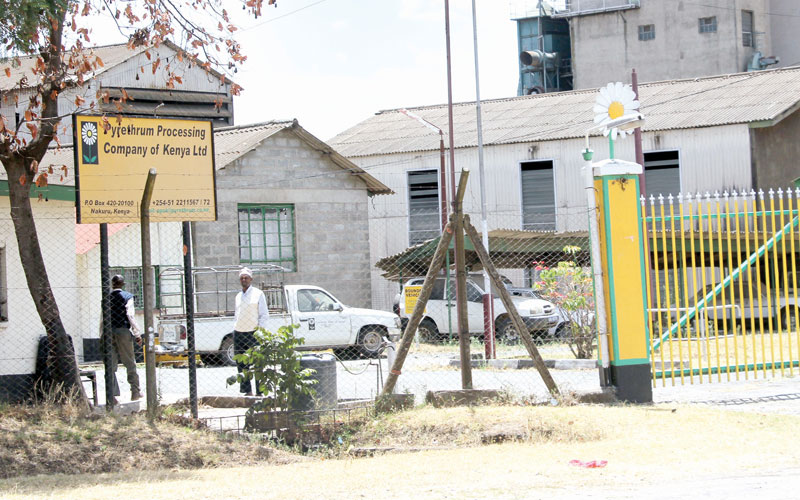Troubled pyrethrum firm asks for bailout

Troubled Pyrethrum Processing Company of Kenya (PPCK) seeks a Sh500 million State bailout to turn around its fortunes.
With the company’s debts standing at Sh2.5 billion, the managing director Joseph Waweru wants the government, through the Ministry of Agriculture, to allocate it cash for operations, saying the amount will help it recover and start repaying the debt in the next two years.
At the moment the company does not have enough planting materials even as calls to farmers to resume production of the cash crop start bearing fruit, having shifted focus on nurseries in Molo, Ngongangeri, Limuru and Kabichbich in West Pokot.
The Nakuru-based firm has been running without a substantive managing director and board of directors since 2008, a factor blamed for rampant corruption in the firm.
Seed production
“My petition to the government is to give us Sh500 million for operations. At the moment the company does not have enough seeds and planting material for production.
However, in the coming year, we want to focus more on serious seed production. Currently we are working on nurseries in Molo, Ngongangeri, Limuru and Kabichbich in West Pokot,” said Waweru.
Pyrethrum farming was once a major source of income generating billions of shillings in foreign revenue before the sub-sector sunk to its knees.
PPCK has seen its fair share of controversy with the most recent being an accusation that the immediate former managing director Paul Lolwerkoi and other senior company officials had flouted procurement laws contrary to the Anti-corruption and Economic Crimes Act, 2003. They were arrested after a series of investigations and formal complaints from workers.
Once considered the golden goose of Kenya’s economy, reviving the dwindling fortunes of the pyrethrum sector is becoming a tall order amid non-payment of workers, corruption scandals, illegal leasing of company assets and suspect tenders at the PPCK.
The DPP had ordered their apprehension and subsequent arraignment in court in the wake of widespread corruption allegations at the processor which have thwarted efforts to revive the cash crop by the national and county governments.
Lolwerkoi is alleged to have borrowed more than Sh2.4 million in January 2018 from Bonnkam Ventures Ltd, which bound the company to a financial responsibility without authorisation.
A report by the Auditor General for the 2017/18 fiscal year indicated that PPCK paid Sh20 million to casuals for work that had not been done.
Farmers, who are the main shareholders in the sector, now want a well-structured system to enable them to engage in the production of the crop.
They are calling for fresh viability tests with plans to scale up production of the crop which used to command 70 per cent of the world market.
Jason Kimani, a veteran pyrethrum farmer from Molo said lack of an oversight body to keep the State corporation, formerly known as Pyrethrum Board of Kenya, in check is the reason behind massive corruption and dishonesty, which later led to non-payment and leasing of the company properties.
He said farmers had opted to uproot the crop for other more viable activities saying it will be hard to convince them to go back to the once lucrative farming business until they are assured of a system that will work.
New plants
However, the new MD, a former financial manager at the Agriculture Food Authority (AFA), says the grim shadows of corruption allegations will not deter his resolve to give his best to the processor.
US Ambassador to Kenya Kyle McCarter said during his tour of the North Rift on December 12, that investors from his country are already in Kenya scouting to establish pyrethrum processing plants.
The investors have already started setting up production factories in Nairobi, he added.
Ministry of Agriculture statistics indicate that the number of pyrethrum farmers growing the crop has nose-dived to between 15,000 and 20,000 in 18 counties. During its hey day, pyrethrum was regarded as the ‘black gold.’













